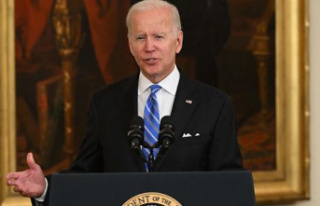The German economy is concerned that the gas tap will continue to be turned off. Especially given the maintenance work on Nord Stream 1 that starts on Monday. Chancellor Scholz announces measures "at an unprecedented pace" at the summit meeting.
Federal Chancellor Olaf Scholz assures the German economy of "great speed" in securing gas supplies in the short term and establishing a CO2-neutral energy supply. "Our ambitious goals can only be achieved with great speed," said Scholz in Munich after a meeting with the four leading associations. When it comes to gas supply, the government will try "at an unprecedented pace" to have liquid gas terminals and gas pipelines built on the north German coast. "My goal: We won't let anyone buy our guts."
On Monday, the Nord Stream 1 pipeline through the Baltic Sea will be shut down due to maintenance work that has been announced for months. An acute concern is that Russia may not turn on the gas tap even after the maintenance is complete. The industry association BDI, the Confederation of German Employers' Associations (BDA), the Association of Chambers of Industry and Commerce (DIHK) and the Central Association of German Crafts (ZDH) called for a stable gas supply in a joint declaration.
Another main demand: the shortening of planning and approval procedures for infrastructure, buildings and technical systems, which previously took years or decades, to just a few months. If such an acceleration does not come, the four leading associations prophesied that central projects of the federal government would fail. "Ambitious goals of climate protection or digitization remain unattainable," said the joint statement.
However, industry did not criticize the federal government. ZDH President Hans Peter Wollseifer, the host, emphasized that business and politics could only solve the challenges "together". "Never before has the conversation with the Federal Chancellor been as important as it is at this time." BDI President Siegried Russwurm does not rule out a stop in Russian gas supplies. "The decision lies with a man in the Kremlin," Russwurm said before meeting Scholz. "You have to prepare for the worst, hope for the best and not talk about the crisis."
In southern Germany in particular, with its large industrial locations, there are concerns that if Russian deliveries are stopped, the pressure in the German gas network will no longer be sufficient to ensure a stable supply. "That can definitely be the case," said Russwurm. "What happens in the event of a fundamental gas shortage in this gas network, there's no empirical values."
Russwurm therefore suggested examining short-term replacement solutions, apart from new lines from the west and north: "In Bavaria, we would do well to consider whether there are other connections that can be upgraded relatively quickly, for example connections to northern Italy ." Perhaps the liquefied gas terminal in Trieste is the better entry point.
According to Russwurm, the stability of the German gas supply also has an impact on neighboring countries: "You have to see the whole thing in a European context," said the BDI-Cef. "Our neighbors to the south and east, the Austrians and the Czech Republic, are partly attached to our lines, and we in Bavaria, on the other hand, are loosely attached to the Italian ones." Whatever is decided in Germany must be coordinated with the neighbors.












